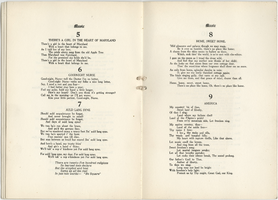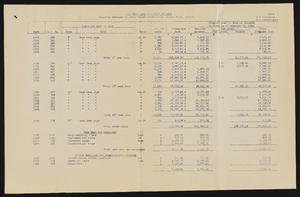Search the Special Collections and Archives Portal
Search Results
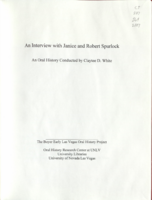
Transcript of interview with Janice and Robert Spurlock by Claytee White, June 17, 2010
Date
Archival Collection
Description
Janice and Robert Spurlock were married in 1990 and each has a lifetime of Las Vegas memories. They have made Sandy Valley home for nearly 32 years. Together the couple recalls the people and places of Las Vegas' past from their points of view during this oral history interview. For Janice the stories begin in the 1930s after her family moved to Las Vegas from California. She was a youngster of about five. Among the topics she talks about is walking to Fifth Street Grammar School, graduating from Vegas High School, and fun had during Helldorado Days. In 1953, Robert arrived. He was a young man headed from Arizona to Colorado seeking work as a welder. He stopped in Henderson, Nevada and never quite made it out of the area. For the next two decades he worked construction and helped build many local landmarks. He shares stories about the range wars and about being accidentally exposed to radiation from the Nevada Test site.
Text

Dr. Deborah Kuhls oral history interview: transcript
Date
Archival Collection
Description
Oral history interview with Dr. Deborah Kuhls conducted by Barbara Tabach on December 29, 2017 for the Remembering 1 October Oral History Project. In this interview, doctor Deborah A. Kuhls describes the preparation and procedures implemented at the University Medical Center of Southern Nevada (UMC) during the night of the October 1, 2017 mass shooting in Las Vegas, Nevada. She describes her experiences from that night and into the next morning, starting from when the trauma center first learned about the shooting to when patients began arriving. She goes into detail on the hospital's Military-Civilian Trauma System Partnership, which allowed for the installation of a second trauma area to treat the large volume of patients. In addition to the events at the hospital, Kuhls talks about the flurry of activities during the week of the shooting, including interviews with various media, the statewide meeting for surgeons, fellows, and residents where "stop the bleed" training was provided, and general meetings with various government officials, including Donald Trump. Deborah Kuhls also discusses the emotional impact of the shooting and its aftermath as well as her goals for the future of trauma in the medical field.
Text
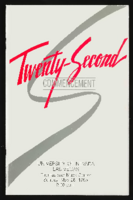
University of Nevada, Las Vegas (UNLV) 22nd commencement program
Date
Archival Collection
Description
Commencement program from University of Nevada, Las Vegas Commencement Programs and Graduation Lists (UA-00115).
Text
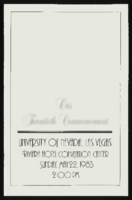
University of Nevada, Las Vegas (UNLV) 20th commencement program
Date
Archival Collection
Description
Commencement program from University of Nevada, Las Vegas Commencement Programs and Graduation Lists (UA-00115).
Text
Florence McClure Papers
Identifier
Abstract
The Florence McClure Papers (1969-2007) are comprised of writings, correspondence, newspaper clippings, handwritten notes, and assorted publications that focus on McClure's work with women's organizations, her efforts on behalf of the Southern Nevada Women's Correctional Facility, and her political advocacy work. It also contains a large number of reference clippings McClure collected on women's issues from local, national, and international publications.
Archival Collection
Mollie Gregory Collection of Oral Histories
Identifier
Abstract
The Mollie Gregory Collection of Oral Histories contains audio interviews and brief transcripts that focus on welfare, family, and women's issues in Nevada from 1970 to 1974. Gregory interviewed Nevada residents including Maya Miller, Ruby Duncan, and Mary Wesley, who described their lives during the anti-poverty and women's rights campaigns in the early 1970s. The collection documents views on welfare; the Equal Rights Amendment; race, discrimination, and civil rights; and political campaigns.
Archival Collection


